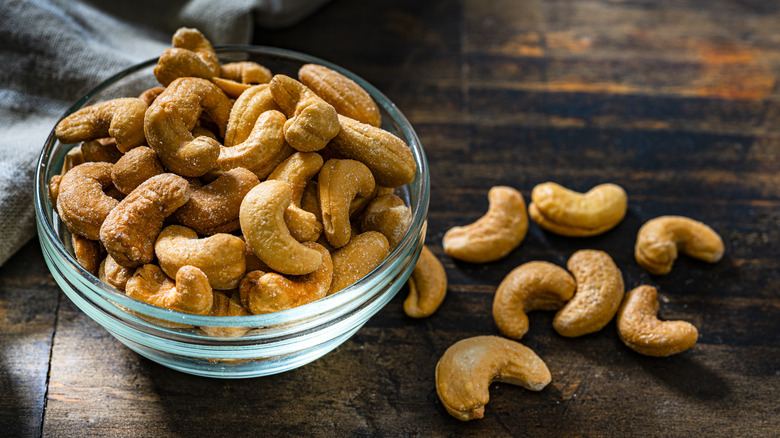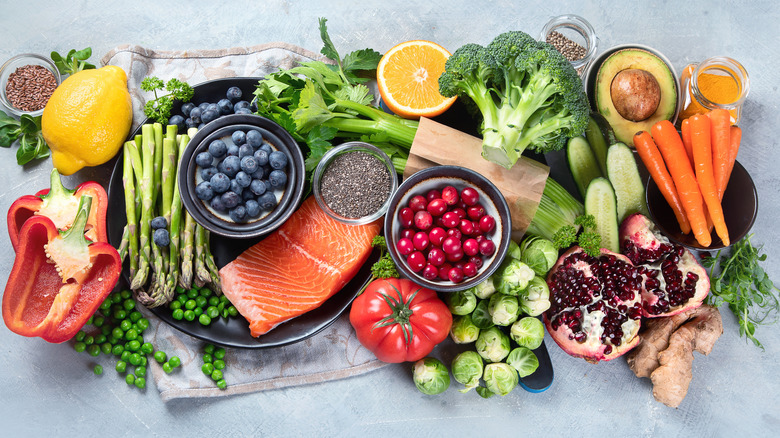Can Eating Cashews Slow Down Aging?
Aging can manifest (read: cause problems for the body) in different ways, which is why so many people are worried about it. As the years pass, our risk of developing various diseases increases, while our ability to reason, recall old memories, and create new ones takes a hit. There are also outward signs of aging, of course, which can be addressed by a variety of cosmetic solutions. But if you're worried about maintaining the way your body functions as you grow older, then you'll definitely want to be more strategic and careful when it comes to your diet.
Fortunately, there are many healthy snacks you can add to your daily meals that can help you deal with the aging process more gracefully. In particular, WebMD suggests cashews, alongside other tree nuts, due to their "big anti-aging powers." As it turns out, cashews do offer some potentially hefty health benefits if you want to slow down aging, in a manner of speaking.
The connection between cashews and aging
According to WebMD, cashews are chock-full of magnesium, manganese, phosphorus, and zinc, as well as vitamins B6 and K. In addition, they're excellent sources of protein (which is crucial for preventing muscle deterioration) and antioxidants (which neutralize free radical damage in the body).
What's more, consuming the right amount of cashews has been associated with reducing LDL (aka "bad") cholesterol and may even prevent stroke and heart disease (due to its magnesium content). It can also lower your risk of diabetes — or, if you already have it, help you manage your condition — because of its low carbohydrate content (which means it won't cause your blood sugar to spike quite like other snacks).
Evidence points toward cashews being an excellent anti-aging food, though more research is needed to establish stronger conclusions. For instance, a 2023 review of previous research published in Nutrients saw a "substantial amount of evidence" that eating cashews and other nuts can lower one's risk of cardiovascular disease, coronary heart disease, and atrial fibrillation. Meanwhile, per a 2019 study published in Current Developments in Nutrition, consuming cashews can lower both your blood pressure and your triglyceride levels.
Other anti-aging foods to add to your diet
But what if you're not fond of cashews? Fortunately, WebMD experts say that there's a wide variety of anti-aging foods that you can incorporate into your diet.
For starters, you'll want to include foods rich in DHA, a type of omega-3 fatty acid, in at least two meals on your weekly meal plan. This will help protect your brain from Alzheimer's disease, and can also sharpen your cognitive skills associated with learning and memory retention. Popular choices include salmon, herring, farmed trout, and other fatty fish, but you can also opt for flaxseed, chia seeds, or walnuts. Next, to safeguard your bone health, you can consume tofu, yogurt, and calcium-fortified orange juice, as well as the ever-popular dairy products cheese and milk. Folks at the age of 51 and above require at least 1,200 milligrams of calcium daily, not just to keep their bones strong, but also to reduce their risk of colon cancer, hypertension, and osteoporosis.
It also helps to keep your plate colorful. The polyphenols in blueberries can keep your brain sharp and your body less likely to suffer the effects of inflammation. Foods rich in lycopene (such as tomatoes and red bell peppers) and sulforaphane (like cruciferous vegetables) can reduce your cancer risk, while vegetables like kale and spinach can protect your eye health.



